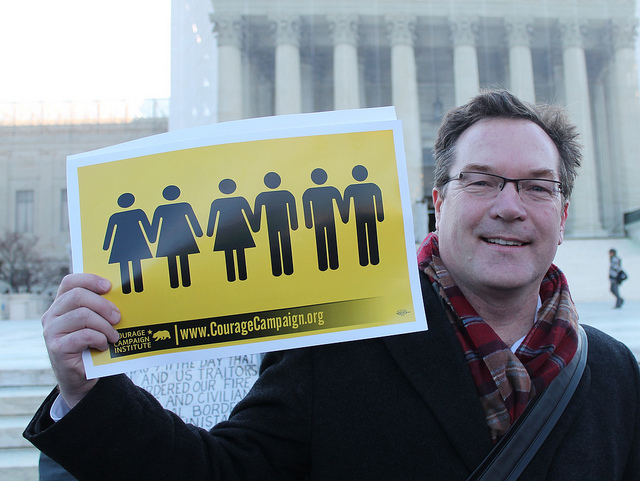Excerpted from Sean McDowell and John Stonestreet’s Same-Sex Marriage: A Thoughtful Approach to God’s Design for Marriage. Baker Books, a division of Baker Publishing Group, 2015. Used by permission. http://www.bakerpublishinggroup.com
As same-sex marriage is now legal across the country, Christians will face scenarios that require a great deal of wisdom. But we warn you from the outset: we don’t have all the answers. These are uncharted cultural waters, and applying absolutes in the context of real-life relationships and a shifting culture is tricky. It makes a difference whether one is an employer or an employee, a close family member or a stranger on an airplane, a Christian or a non-Christian.
While there are some lines that believers ought not cross, there are some decisions that are matters of conscience. In 1 Corinthians, Paul says, “For why should my liberty be determined by someone else’s conscience? So, whether you eat or drink, or whatever you do, do all to the glory of God” (1 Corinthians 10:29 and 31).


1. What if my business is asked to provide services for a same-sex union ceremony?
No Christian should refuse to serve a person because they are gay or transgender. However, a distinction may be made between serving the person and participating in their same-sex wedding. Serving a cupcake to a gay couple is not the same as baking a rainbow shaped cake with two grooms on top for their ceremony.
Though religious freedom is guaranteed in the U.S. Constitution, there is no guarantee it will hold up in front of activist judges. Still, there are ways to get ahead of the situation:
- Describe how Christian convictions shape the company in the policy manual.
- Document any case in which religious convictions lead to a particular job being accepted or rejected.
- Be known as a place where everyone is welcome, and train employees specifically in relating to gay customers. If trouble arises, proof of training employees and a statement of support from a gay customer may be helpful.
- Show genuine care for the person asking for the services. Ask questions and get a full picture of their situation before communicating the decision to them.
- If forced to reject business, do so from the perspective of the written policy. Do not comment on the specific person soliciting the services or on their situation. Be polite and, of course, smile!
- Refer customers to other providers who will offer the requested services. Have business cards ready.
2. What if a same-sex couple shows up at my church and/or wants to send their children to Sunday school?
How would you respond if a cohabiting couple showed up at church and brought their children to Sunday school? The answer should be no different (and, hopefully, the answer is, “we would welcome them”). We can welcome people into the Church without compromising biblical standards.
When it comes to membership, leadership and receiving communion (or other ordinances considered sacred by the Church), requirements should be clearly stated in writing.
There’s also the issue of how a larger congregation or school community will respond to the presence of same-sex couples. The time to find out is not when the first couple walks through the door. Pastors and leaders should communicate how their church or organization will treat gay and lesbian couples and their children. Appropriate training should be provided.
“But we don’t want our children to see such things in church!” you may reply. Well, they will see it in culture. Why not use the Church to help Christians understand the gay lifestyle properly?
3. What if my son or daughter thinks gays should be allowed to marry?
When I (Sean) was a teenager, I announced to my father, who has spent his life proclaiming and defending the Christian faith, than I wasn’t sure I believed in Christianity anymore. He lovingly said that he respected my questions and offered to help me search any way he could. He encouraged me to hold on to my faith unless I was persuaded it was not true, and he assured me that he and my mom loved me regardless of the outcome.
That’s a great way to handle any teenage questions about the faith. It’s not a sin to question, and mentors should guide the questioning process. Be open, ask questions, give space, point to the best resources, and walk through the questions with the questioner. Above all, maintain the relationship.
4. What if I hear a fellow Christian “gay-bashing”?
Our faith requires us to defend anyone who is mistreated, even if we disagree with them. To do so, we may need to make the difficult decision to call out inappropriate words and actions from those on “our side.” It’s tempting to consider those more extreme than us as “quirky” or “intense,” while assuming anyone who disagrees is “evil” and even “dangerous.” So, we end up tolerating the extremist on our side, like a drunken uncle who shows up every Thanksgiving (“After all,” we say, “he’s family!”). But the moment the drunken uncle becomes abusive, tolerating him becomes enabling him. We must not, by our actions or our passivity, enable the mistreatment of the gay community.
As a Church and as a culture, we are headed into uncharted waters. Yes, same-sex marriage is here. The real question is, how will you respond? Will you model biblical sexuality and marriage in your own life? Will you lovingly and graciously defend marriage? Will you help build a positive marriage culture? We will only positively influence lives and culture if each of us takes responsibility for the opportunities God has given us.
Is there enough evidence for us to believe the Gospels?






































